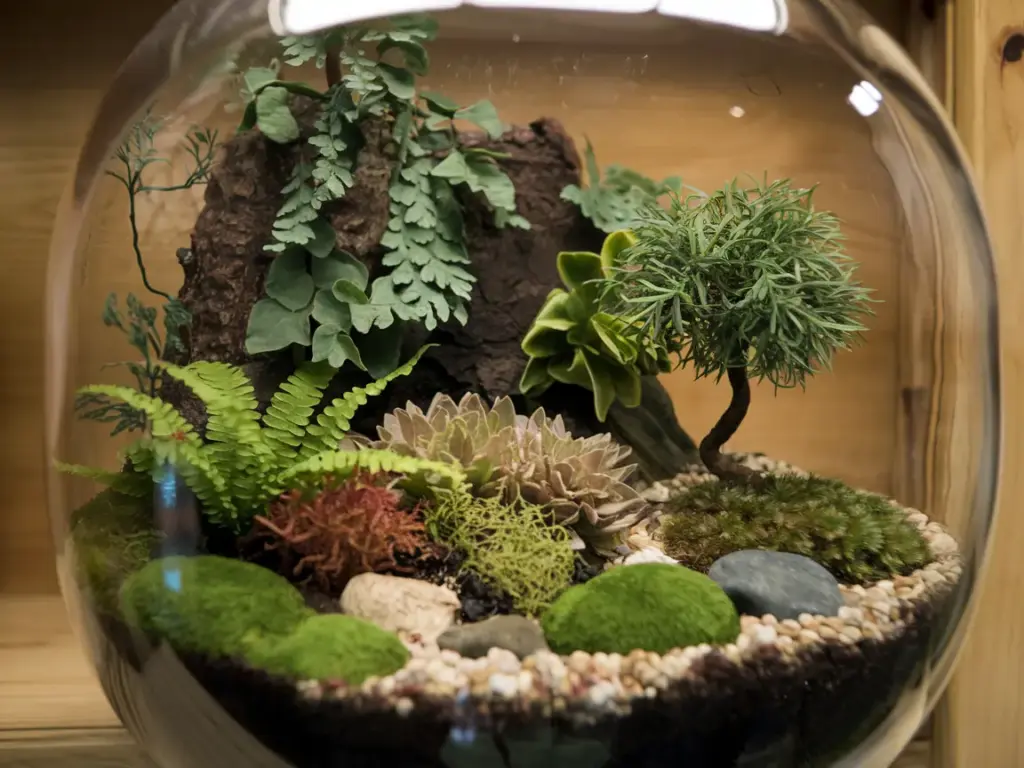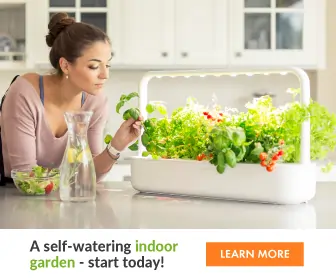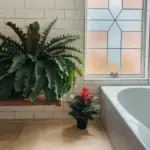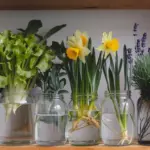10. Create a Terrarium Garden

After experimenting with various humidity methods, creating a closed terrarium became my favorite way to maintain perfect humidity levels. It’s like having a tiny self-sustaining rainforest right on your desk! Let me share what I’ve learned from building dozens of these magical miniature worlds.
Selecting the Perfect Container
The container makes or breaks your terrarium:
- Glass containers work best (avoid plastic)
- Choose vessels with proper sealing lids
- Look for wide openings for easy planting
- Consider viewing angles for display
- Size matters: bigger is more stable
Essential Layering Guide
Here’s my foolproof layering technique:
- Drainage layer: 1-2 inches of activated charcoal
- Barrier layer: Sphagnum moss
- Substrate layer: Special terrarium soil mix
- Decorative layer: Moss and stones
- Living layer: Your chosen plants
Best Plants for Terrariums
These plants have thrived in my terrariums:
- Fittonia (nerve plant)
- Peperomia varieties
- Mini ferns
- Cryptanthus
- Moss species
- Small Calathea varieties
Maintenance Schedule
My simple care routine:
- Daily: Check for condensation levels
- Weekly: Monitor plant health
- Monthly: Trim any overgrown plants
- Quarterly: Deep clean glass
- Yearly: Soil refresh if needed
Watering Guidelines
Less is more with terrariums:
- Water only when soil feels dry
- Use spray bottles for gentle watering
- Avoid waterlogged soil
- Monitor condensation cycles
- Look for signs of drought
Climate Control Tips
Creating the perfect environment:
- Maintain 70-80°F temperature
- Keep out of direct sunlight
- Create proper ventilation
- Monitor humidity levels
- Adjust lid position as needed
Common Problems Solved
Issues I’ve encountered and fixed:
- Excess moisture: Remove lid temporarily
- Mold growth: Add springtails
- Leggy plants: Adjust lighting
- Root rot: Improve drainage
- Pest infestations: Quarantine new plants
Decorative Elements
Make it beautiful and functional:
- Use small decorative stones
- Add miniature figurines
- Include natural wood pieces
- Create different height levels
- Install tiny LED lights
Your terrarium garden is not just a humidity solution – it’s a living piece of art that creates its own perfect microclimate! Remember, patience is key when setting up your terrarium. Give it time to establish its own natural cycle, and you’ll be rewarded with a thriving miniature ecosystem that practically maintains itself.
Conclusion
Creating the perfect humid environment doesn’t have to be complicated or expensive! By implementing one or more of these methods, you’ll be well on your way to providing your tropical plants with their ideal growing conditions. Remember, start with one method and monitor your plants’ response before adding more. Happy growing! Have you tried any of these methods? Start with the pebble tray – it’s my personal favorite for beginners!









GIPHY App Key not set. Please check settings